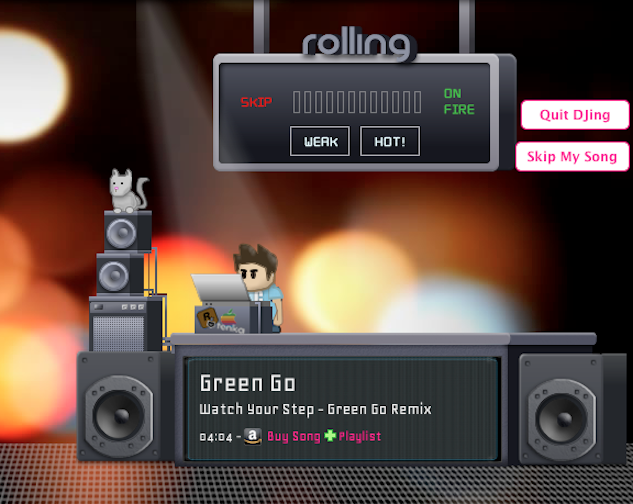
Whenever a popular web startup appears on the scene, it doesn’t take long for an onslaught of clones to show up. And ever since music sharing site Turntable.fm launched in late May, we’ve been expecting duplicate startups to follow.
[aditude-amp id="flyingcarpet" targeting='{"env":"staging","page_type":"article","post_id":316279,"post_type":"story","post_chan":"none","tags":null,"ai":false,"category":"none","all_categories":"business,","session":"D"}']The first such copycat, Rolling.fm, launched a test version of its service in early August.
“Some of the core elements may be similar (to Turntable), I’ll grant you that, but our goals for the site are much different,” said Rolling co-founder and former Google senior software engineer Tim Zhou in an interview with VentureBeat. “We are going for a much more social angle here. The end goal is not to become a music curation tool.”
AI Weekly
The must-read newsletter for AI and Big Data industry written by Khari Johnson, Kyle Wiggers, and Seth Colaner.
Included with VentureBeat Insider and VentureBeat VIP memberships.
“We’re more interested in building a social space for communication, where people can hang out, chat, play card games, listen to music or whatever,” Zhou said. “Music is the initial wedge, but we want to branch out,” he said, making reference to integrating YouTube videos to play in the background while people chat in one of the rooms.
Rolling.fm and Turntable.fm are the first of a new breed of socially enhanced music services. The sites act as virtual dance clubs where people take turns playing music.
Rolling.fm has considerably better communication features than Turntable.fm, which has a straightforward chat window and little else besides the basic DJ features. In addition to a music room group chat, Rolling.fm has tabs for a list of everyone in the room and another for friends. You can even send private messages to those within the room and Facebook friends regardless of what they’re doing on the service.
Rolling is growing at a steady rate, too. Zhou said the site was bringing in a couple thousand new users per day just before music blog Evolver.fm published a post about it. If Turntable.fm’s growth is any indication, Rolling’s user numbers are likely to soar over the course of the next month.
Rolling is a part of social media advertising startup Tenka, which Zhou co-founded in May 2010 with former Google employee Thomas Chau and Tenka CEO Nhon Ma. The startup is funded by Great Oaks Venture Capital with additional angel investment by Jeff Fluhr.
[aditude-amp id="medium1" targeting='{"env":"staging","page_type":"article","post_id":316279,"post_type":"story","post_chan":"none","tags":null,"ai":false,"category":"none","all_categories":"business,","session":"D"}']
The three co-founders began exploring the idea of spinning a music service out of Tenka in May, according to Zhou, who registered the rolling.fm domain June 27.
“Once we figured out what we wanted to do, we discovered Turntable.fm, which had just launched not even a month ago,” Zhou said. “At first we were distraught since someone was already occupying the space. But ultimately we decided that, that shouldn’t deter us from jumping in anyways.”
And again, like Turntable.fm, Rolling allows the audience to vote on each song. If enough people hate the song selection, it gets skipped in favor of the next DJ in line. When people like a song, points are awarded to the DJ, who can redeem them for avatar upgrades.
[aditude-amp id="medium2" targeting='{"env":"staging","page_type":"article","post_id":316279,"post_type":"story","post_chan":"none","tags":null,"ai":false,"category":"none","all_categories":"business,","session":"D"}']
Even the way Rolling handles licensed music is modeled almost exactly like Turntable.fm: DJ playlists are comprised of songs pulled from the company’s library of content or uploaded directly by each individual user. And just like Turntable, Rolling pays a fee to non-profit performance rights organization Sound Exchange for every song played through the service.
With so many similarities, it’ll be difficult for Rolling.fm to avoid getting branded as an outright clone. However, there are some notable differences between the two music services.
For instance, Rolling’s point system subtracts points from a DJ if they play a song that the room doesn’t like. By contrast, Turntable.fm’s points can only be gained and/or redeemed. This poses a problem because the most of the extremely popular music rooms are always dominated by a handful of the same Turntable.fm DJs. Rolling avoids this problem by kicking DJs off the virtual stage after their second skipped track.
Also, there’s a cat located on the speakers who doesn’t mind loud noises and apparently enjoys every track played.
[aditude-amp id="medium3" targeting='{"env":"staging","page_type":"article","post_id":316279,"post_type":"story","post_chan":"none","tags":null,"ai":false,"category":"none","all_categories":"business,","session":"D"}']
“Yes, the cat is awesome. Thomas is a cat guy so I think he just dropped him in. Soon there will be more stuff like that available in rooms though.”
The Restroom Experience is an example of how Zhou and the team can build different experiences that can then be monetized by creating rooms for marketing and promotional purposes. So, for example, if HBO wanted to run a series of True Blood promotions, they could pay Rolling to create a Fangtasia lounge (which is a popular venue referred to in the HBO original vampire TV show).
“At this point, we are focused on getting traction,” Zhou said. “We’ll see when the right time to introduce those (sponsored) rooms will be. What we don’t want to do is become an uncool, commercial space.”
[aditude-amp id="medium4" targeting='{"env":"staging","page_type":"article","post_id":316279,"post_type":"story","post_chan":"none","tags":null,"ai":false,"category":"none","all_categories":"business,","session":"D"}']
VentureBeat's mission is to be a digital town square for technical decision-makers to gain knowledge about transformative enterprise technology and transact. Learn More
